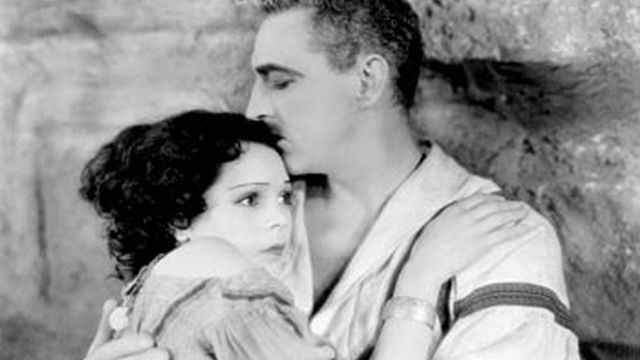Eternal Love (1929) 
“THE HEART QUEEN (Carmilla Horn) – Pride of the mountain country, the despair of men’s hearts; betrothed to one, her heart belonged to another.”

Director: Ernst Lubitsch
Cast: John Barrymore, Camilla Horn, Victor Varconi
Synopsis: In the Swiss Alps of the early 19th century, a couple forced into loveless marriages struggle to find happiness with one another.
Its 1802, and Switzerland’s having a rough old time of it. Their noisy neighbours France and Austria are embroiled in a fierce war which sees them stomping over the Alpine mountains which lie between them in the course of their skirmishes. The French occupiers issue a decree ordering the local townsfolk to give up their arms under pain of punishment, and although initially rebellious, they’re persuaded to do just that by the Reverend Tass (Hobart Bosworth). This confiscation of arms has nothing to do with the plot other than to illustrate the macho individuality of Marcus Paltran (John Barrymore), a rugged man of the mountains who refuses to yield his arms, neither to local man Lorenz Gruber, (Victor Varconi) whose attempts to relieve him of his rifle he brushes aside, nor to sweet Ciglia (Camilla Horn), the Reverend’s niece on whom Marcus has a major crush. However, to show just how much Marcus cares about Ciglia, screenwriter H. H. Caldwell has him later hand in his rifle to Ciglia just as Gruber, who also has a major cost of the hots for Ciglia, is attempting to replace him in her affections.
The relationship between Marcus and Ciglia flourishes, despite the Reverand’s disapproval and the smouldering looks Gruber gives the couple each time he sees them. But Marcus gets drunk at the masked party thrown to celebrate the French finally leaving the village, and gets a little too touch-feely for Ciglia’s liking on the carriage ride home. Fortunately for Ciglia, there’s a masked pedestrian on the roadside whom they stop to give a ride, much to Marcus’s disgruntlement. Any passenger would have been bad enough, but this one happens to be Pia (Mona Rico), a local girl whom, as we saw in earlier scenes, has something of a fixation on Marcus.
Despite arriving home in a state of heightened frustration, Marcus still manages to find the self-control necessary to rebuff the persistent Pia’s advances. But when he retires to his bedroom to find she has divested herself of her clothes and made herself comfortable in his bed, he finds her impossible to resist. Their tryst turns out to be a monumental example of bad timing, however, because just as their doing the deed, Ciglia’s finally talking the old reverend into allowing them to finally get wed. Needless to say, Marcus has a major knuckles-in-the-mouth moment the following morning when he realises just how badly he’s messed up…
The death knell for silent movies had already sounded when Eternal Love was released in May 1929, and it proved to be the final silent for both leading man Barrymore and director Ernst Lubitsch. It’s a short film – only 68 minutes long – but, as you’d expect from a Lubitsch movie – it’s a well-made one, with an unusually uncouth hero in Marcus Paltran. Here’s a man who drunkenly pushes other dancers aside when he wants some room to dance with Ciglia, and who brazenly steals other people’s drinks from right under their noses. By contrast Lorenz Gruber is a relatively decent, honourable man (ok, he’s probably a bit dull), and yet Ciglia doesn’t give him a look in until she learns of Marcus’s infidelity. In fact, the movie has you feeling more sorry for Lorenz and Pia than for Marcus and Ciglia; at least they both love the people they marry, and when she mistakenly believes Marcus has become lost in the mountains during a fierce snow storm Pia’s out there frantically banging on every neighbour’s door trying to rustle up a search party. Of course her attempts meet with no success – no one’s going to go out in a snow storm looking for a bloke who steals their pints, are they?
Eternal Love’s brief running time means there’s little time to waste in the telling of the story, and this proves to be a point in its favour. Too often, otherwise well-made and beautiful silent movies are nearly ruined by a funereal pace. Here’s a movie that proves that the absence of sound didn’t mean the makers have to take three times as long to get the meaning of a scene across to its audience. Barrymore’s a little too old for his role – although he’s great when playing drunk, which, let’s face it, was something at which he’d had plenty of real-life practice – but he’s never unbelievable in the part. Camila Horn is exquisite, but can’t hold a candle to Mona Rico whose vibrant performance makes her Pia appear to be more of a catch than the prim Ciglia.
(Reviewed 3rd December 2013)
httpv://www.youtube.com/watch?v=Y-wev6YGSVk
